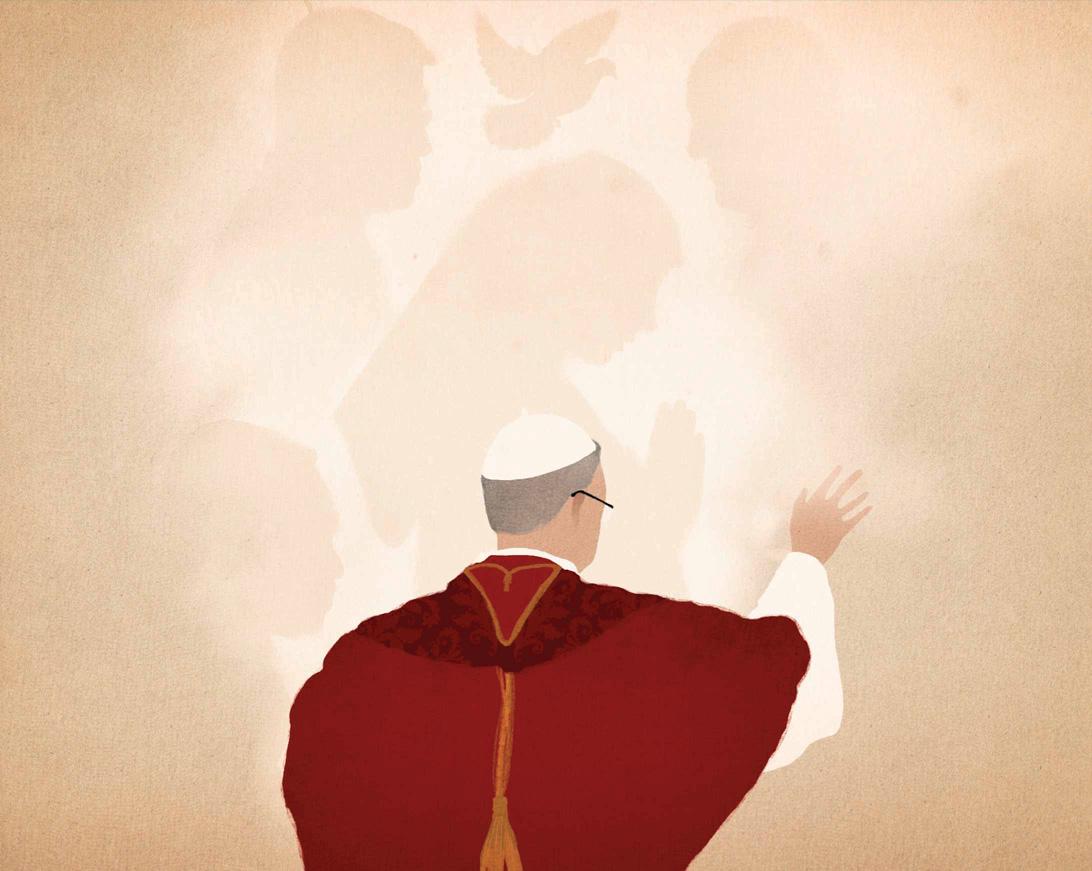試す 金 - 無料
"The pope doesn't have to be a great theologian - but he has to be in tune with the zeitgeist"
BBC History UK
|July 2025
In May, the new Pope Leo XIV was chosen by the conclave, a secretive gathering of cardinals with a history stretching back many centuries. Matt Elton spoke to REBECCA RIST about the politics, controversies and far-reaching impacts of past papal elections
-

Matt Elton Can you briefly explain the papal conclave, and who's involved?
Rebecca Rist It’s based on the system instituted by Pope Gregory X in the 13th century. After the death of a pontiff, members of the College of Cardinals — a select group of Catholic senior prelates appointed by the pope and aged under 80 - gather from all over the world to elect a replacement. These senior clergy, on whom the choice of the next pope hinges, are sequestered - locked in the Sistine Chapel [‘conclave’ derives from cum clave, ‘with a key’] - until they reach a two-thirds majority vote.
White smoke is then sent up to announce to Rome that the new pope has been selected, and he’s presented on the Vatican balcony with the words “Habemus Papam” [“We have a pope”].
 How were popes selected before conclaves were introduced?
How were popes selected before conclaves were introduced?From the early Middle Ages, German kings and emperors had a hand in this - particularly Holy Roman Emperors after Charlemagne. Sometimes popes were acclaimed, put in by the Roman populace and the Roman clergy. And sometimes the Roman aristocracy was most influential: important families such as the Orsini, from whom five popes were appointed between the eighth and 18th centuries, as well as dozens of cardinals.
このストーリーは、BBC History UK の July 2025 版からのものです。
Magzter GOLD を購読すると、厳選された何千ものプレミアム記事や、10,000 以上の雑誌や新聞にアクセスできます。
すでに購読者ですか? サインイン
BBC History UK からのその他のストーリー

BBC History UK
Hymn to life
Scripted by Alan Bennett and directed by Nicholas Hytner - a collaboration that produced The Madness of King George and The History Boys – The Choral is set in 1916.
1 min
December 2025

BBC History UK
Helen Keller
It was when I was eight or nine years old, growing up in Canada, and I borrowed a book about her from my local library.
2 mins
December 2025

BBC History UK
Spain's miracle
The nation's transition from dictatorship to democracy in the late 1970s surely counts as one of modern Europe's most remarkable stories. On the 50th anniversary of General Franco's death, Paul Preston explores how pluralism arose from the ashes of tyranny
8 mins
December 2025

BBC History UK
Just how many Bayeux Tapestries were there?
As a new theory, put forward by Professor John Blair, questions whether the embroidery was unique, David Musgrove asks historians whether there could have been more than one 'Bayeux Tapestry'
7 mins
December 2025

BBC History UK
In service of a dictator
HARRIET ALDRICH admires a thoughtful exploration of why ordinary Ugandans helped keep a monstrous leader in power despite his regime's horrific violence
2 mins
December 2025

BBC History UK
The Book of Kells is a masterwork of medieval calligraphy and painting
THE BOOK OF KELLS, ONE OF THE GREATEST pieces of medieval art, is today displayed in the library of Trinity College Dublin.
3 mins
December 2025

BBC History UK
Passing interest
In his new book, Roger Luckhurst sets about the monumental task of chronicling the evolution of burial practices. In doing so, he does a wonderful job of exploring millennia of deathly debate, including the cultural meanings behind particular approaches.
1 mins
December 2025

BBC History UK
Is the advance of AI good or bad for history?
As artificial intelligence penetrates almost every aspect of our lives, six historians debate whether the opportunities it offers to the discipline outweigh the threats
8 mins
December 2025

BBC History UK
Beyond the mirage
All serious scholarship on ancient Sparta has to be conducted within the penumbra of the 'mirage Spartiate', a French term coined in 1933 to describe the problem posed by idealised accounts of Sparta.
1 mins
December 2025

BBC History UK
He came, he saw... he crucified pirates
Ancient accounts of Julius Caesar's early life depict an all-action hero who outwitted tyrants and terrorised bandits. But can they be trusted? David S Potter investigates
10 mins
December 2025
Listen
Translate
Change font size

